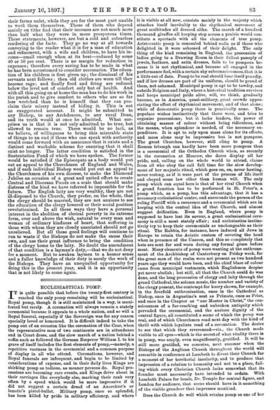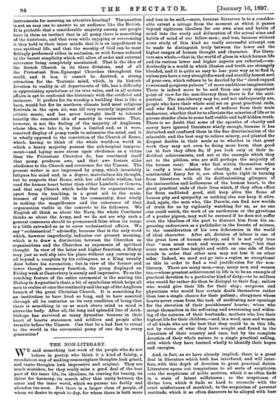ECCLESIASTICAL POMP.
IT is quite possible that before the twenty-first century is reached the only pomp remaining will be ecclesiastical. Royal pomp, though it is still maintained in a way, is mani- fested but rarely. A coronation will always remain a stately ceremonial because it appeals to a whole nation, and so will a Royal funeral, especially if the Sovereign was for any reason specially loved or honoured. It is difficult indeed to take the pomp out of an occasion like the coronation of the Czar, when the representative men of two continents are in attendance and in Court dress, and the slow march of a nation behind a coffin such as followed the German Emperor William I. to his grave of itself includes the first elements of pomp,—namely, a repetitive vastness in the ceremonial and a common purpose of display in all who attend. Coronations, however, and Royal funerals are infrequent, and begin to be limited by considerations of expense, and in their daily lives Kings are shirking pomp as tedious, as meaner persons do. Royal pro- cessions are becoming rare events, and Kings drive about in their carriages like everybody else, marking their rank very often by a speed which would be more impressive if it did not suggest a certain dread of an Anarchist's or lunatic's pistol-bullet. Military pomp, once so splendid, has been killed by pride in military efficiency, and where it is visible at all now, consists mainly in the majesty which attaches itself inevitably to the rhythmical movement of great multitudes all dressed alike. The march of a hundred thousand giraffes all keeping step across a prairie would con- stitute a spectacle with all the elements of true pomp. Aristocratic pomp is concealed behind walls as if those who delighted in it were ashamed of their delight. The only thing of the kind remaining in England, the procession of ladies going to a Drawing Room in their fullest panoply of jewels, feathers, and satin dresses, fails to be pompous be- cause it is not rhythmical, and because all engaged in the performance feel, with a certain shy subconsciousness, that it is a little out of date. Pomp to be real should bear itself proudly, and if low dresses are part of its uniform, should be proud of them, not ashamed. Municipal pomp is apt to be tawdry, and outside Belgium and Italy, where a historical tradition survives and keeps municipal pride alive, will, we think, gradually become, as in America, quasi-military, great crowds appre- ciating the effect of rhythmical movement, and of that alone; while of democratic pomp there is practically none. The populace wishes instinctively that there were, and tries to organise processions; but it lacks leaders, the power of obtaining masses of colour without being ridiculous, and the means, when splendour is needed, of the necessary ex- penditure. It is apt to rely upon mass alone for its effects, and mass alone may be impressive but is not pompous. The great Churches, however, still cling to pomp. A Roman triumph can hardly have been more pompous than is a ceremonial of the Orthodox Church when, as recently in the coronation at Moscow, she dares display all her pride, and, calling on the whole world to attend, claims from all who obey the call fall time for the slow develop- ment of her majestic ritual, which goes on, on, never hasting, never resting, as if it were part of the process of life itself and obeyed some law other than human will. The only pomp which can equal hers is that of her rival Church when a grand function has to be performed in St. Peter's, a pomp which, as a pomp, has this advantage, that it has a necessary ecclesiastical centre, and surrounds the person of the ruling Pontiff with a reverence and a ceremonial which are in keeping with the central idea of that Church, and almost suggest deification. Even in England, where pomp is supposed to have lost its savour, a great ecclesiastical cere- mony is still a most stately affair ; and ecclesiastics instinc- tively try to keep their ceremonials as unchangeable as their ritual. The Rabbis, for instance, have induced all Jews in Europe to retain the Asiatic custom of covering the head when in presence of the Unseen, and this so completely that hats are sent for and worn during any formal grace before meat. Many elements of pomp were wanting at the enthrone- ment of the Archbishop of Canterbury on Friday week, for the great men of the realm were not present as two hundred years ago they would have been, and the chief blaze of colour came from municipal vestments, which Englishmen despise yet never abolish ; but still, all that the Church could do was done, and the long procession of clergy and laity through the grand Cathedral, the solemn music, the number and variety of the clergy present, the contempt for hurry shown, for example, in the fourfold enthronisation, once in the Cathedral as Bishop, once in Augustine's seat as Primate, once as Prior, and once in the Chapter as "our Master in Christ," the con- sciousness of a far-reaching and unbroken antiquity which pervaded the ceremonial, and the austere dignity of the central figure, all constituted a scene of which the pomp was real, and of which Churchmen read next day with the kind of thrill with which loyalists read of a coronation. The desire to see that which they reverenced—viz., the Church made visible to all eyes—which is the secret of what vitality there is in pomp, was amply, even magnificently, gratified. It will be still more gratified, we conceive, next summer when the Bishops of the Anglican Church throughout the world will assemble in conference at Lambeth to divest their Church for a moment of her territorial insularity, and to produce that impression of a relation to humanity and not to a place, fail- ing which every Christian Church lacks somewhat that its founder must necessarily have intended to ordain. With Lambeth Palace for locale, Dr. Temple for central figure, and London for audience, that scene should have in it something of the visible grandeur that impresses mankind.
Does the Church do well which retains pomp as one of her instruments for securing an attentive hearing P The question is not an easy one to answer to an audience like the British.
It is probable that a considerable majority among our people have in them an instinct that in all pomp there is something of the histrionic, and that even while enjoying or reverencing it they hold in their inner minds that it is an impediment to true spiritual life, and that the worship of God can be most fittingly performed either in seclusion, or with forms reduced to the barest simplicity which will allow of order and external reverence being completely maintained. That is the idea of the Scotch Church in its three divisions, and of all the Protestant Non-Episcopal Churches throughout the world, and it has, it cannot be doubted, a strong attraction for the Teutonic mind, which, in its historic devotion to reality in all departments of life, has a difficulty in appreciating symbolism at its true value, and in all serious affairs is apt to confound the histrionic with the artificial and insincere. It prefers for its worship a building that is like a barn, would but for its northern climate hold most religious festivals in the open air, was till very recently impatient of artistic music, and has never brought itself to tolerate heartily the remotest idea of sanctity in vestments. That, however, is not the feeling of the majority of Anglicans, whose idea, we take it, is that a limited and, as it were, reserved display of pomp tends to solemnise the mind, and it is wholly opposed to the conviction of the Church of Rome, which, having to think of the whole world—a world in which a heavy majority possess the sub-tropical tempera- ment—and laying more stress upon obedience as a virtue than the Protestant Churches do, has convinced itself that pomp produces awe, and that awe fosters alike obedience to the Church and reverence for the Unseen. The present writer is not impressed by pomp, which invariably fatigues his mind and, in a degree, materialises his thought, but he suspects that Rome, with her old subtle wisdom, has read the human heart better than either Lambeth or Geneva, and that any Church which holds that its organisation, as apart from its teaching, is a great aid to the main- tenance of spiritual life in the community, does wisely in making the magnificence and the coherence of that organisation visible in the concrete to its followers. We English all think so about the Navy, the whole Continent thinks so about the Army, and we do not see why such a general consensus should be pronounced false when its range is a little extended so as to cover ecclesiastical affairs. We say " ecclesiastical " advisedly, because that is the only word which, however imperfectly, indicates our present meaning, which is to draw a distinction between the Churches as organisations and the Churches as exponents of spiritual thought. In view of the latter and higher function, a Bishop may just as well slip into his place without any ceremony at all beyond a reception by his colleagues, as a King usually does before his coronation; but in view of the former and lower though necessary function, the pomp displayed on Friday week at Canterbury is seemly and impressive. To us the touching feature of the entire ceremonial is the seating the Bishop in Augustine's chair, a bit of symbolism which helps all men to realise at once the continuity and the age of the Anglican branch of the great Christian Church. It is something for an institution to have lived so long, and to have asserted through all its centuries as its very condition of being that there is something in us as much above mind as mind is above the body. After all, the long and splendid line of Arch- bishops has survived so many dynasties because in their heart of hearts statesmen and soldiers and people alike tremble before the Unseen. Can that be a bad fact to reveal to the world in the ceremonial pomp of one day in every generation P







































 Previous page
Previous page